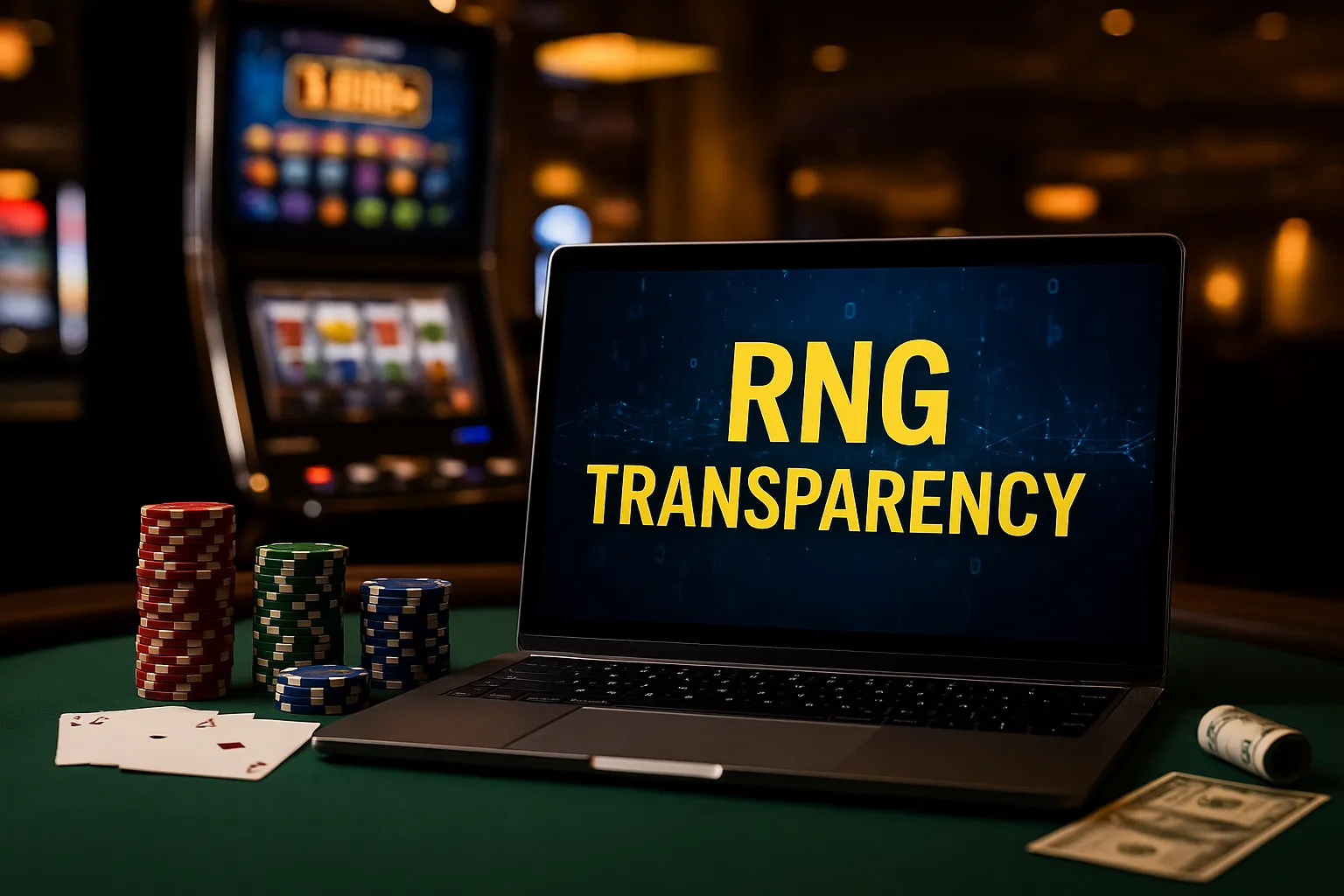Random Number Generators (RNGs) are the invisible croupiers of online gambling. They decide whether your next spin, card draw, or dice roll is a win or a wipeout. Most of us accept that “the computer is fair” because a footer says so, but after years of playing, testing, and even grilling support teams about certification reports, I’ve landed on a firm stance: yes, players should absolutely demand RNG transparency. Not because we’re trying to reverse-engineer the code, but because knowing how outcomes are created—and who’s auditing that process—lets us gamble with informed consent instead of blind faith.
What an RNG Actually Does (Without the Math Lecture)
An RNG is a piece of software that spits out long strings of numbers so quickly and unpredictably that no one—not the casino, not you—can guess what comes next. Those numbers are then translated into game results: which symbols land, what card turns over, how the wheel stops. A good RNG is like a well-shuffled deck every single millisecond. A bad one is exploitable, biased, or simply opaque, and that’s when trust erodes.
Casinos and game studios typically say their RNGs are “certified” or “audited,” but the depth of those audits varies wildly. Some regulators demand full algorithm inspections and ongoing monitoring; others accept a one-off lab report filed years ago. When you step outside the UKGC bubble and play at a non GamStop casino, you’ll see plenty of “RNG certified” badges. Without robust oversight, though, those badges can be little more than marketing stickers unless you can read the paperwork behind them or trust the certifying body.
Why RNG Transparency Matters More Than You Think
Transparency isn’t about spoiling the game’s randomness—it’s about understanding the framework that guarantees it. When a casino publishes its testing partners, shows dated certificates, and explains how frequently audits happen, you can evaluate risk the same way you’d assess a bank’s governance policies or a fintech app’s security posture. Think about it: you wouldn’t deposit money with a company that refuses to explain where the funds go or who checks the books. Gambling funds deserve the same diligence.
The less transparent a platform is, the more you rely on hope. Hope is fun on a single spin; it’s reckless as a business model for your entertainment budget. Knowing that an independent lab checks the source code, seeds, and distribution of results doesn’t guarantee personal profit, but it does guarantee the game isn’t cheating.
The Gap Between “Certified” and “Comprehensible”
I’ve seen RNG certificates buried in PDF footnotes, written in dense lab jargon. Technically, the data is “available,” but there’s a big difference between publishing a checksum and explaining—plainly—what it means for your session. Casinos that genuinely respect players will translate the tech: they’ll tell you which lab (eCOGRA, iTech Labs, GLI, BMM, QUINEL, etc.) tested what, when, and for which games. They’ll date-stamp it, refresh it annually, and link directly to logs or monthly RTP summaries.
If a site only throws around buzzwords—“provably fair,” “independently verified,” “RNG tested”—with no supporting documents or plain-language breakdowns, take it as a warning sign. Transparency isn’t a single sentence; it’s an open door.
How Offshore Sites Complicate the Picture
Offshore platforms can be perfectly legit, but some operate under minimal regulation. That means you must become your own compliance officer. Ask: Who licensed the casino? Does that jurisdiction require ongoing RNG checks? Is the lab recognized by major regulators? Can I see recent RTP reports by game, not just a single overall site figure?
If support can’t answer those questions or dodges them, consider walking. Your leverage as a player is your deposit: vote with it.
RNG vs. RTP: Know the Difference
RNG fairness and RTP (Return to Player) percentages are siblings, not twins. RNG ensures outcomes are random and unbiased. RTP determines how much, over the very long term, the game pays back. A fair RNG can still deliver a brutal cold streak because randomness includes long losing runs. Likewise, a high RTP game is meaningless if the RNG is rigged. You need both: a transparent, audited RNG and a published, realistic RTP.
Many studios now publish theoretical RTP ranges (e.g., 94%–96.5%). Some casinos choose the lower setting to boost margins. Real transparency would show which setting your chosen site is running and provide monthly realized RTP stats for each game. A few operators do this. Most don’t—yet. That’s why we should keep pushing.
What “Provably Fair” Actually Means
In crypto casinos, “provably fair” games let you verify each outcome using cryptographic hashes and seeds you can inspect. It’s a step forward, but don’t confuse buzzwords with usability. Many players never check the hashes, and some implementations are too complex for casual verification. True transparency isn’t just theoretical verifiability; it’s accessible proof that ordinary players can understand without a CS degree.
Personal Experience: When Transparency Changed My Behavior
There was a period where I played slots on a Curacao-licensed site because the promos were irresistible. After a weird run of near-misses, I asked support for the latest RNG certificate. They sent a generic PDF with no game list, no dates, no lab signature—just a logo. That alone didn’t prove wrongdoing, but it told me they didn’t care enough to show their work. I cashed out (slowly, thanks to weekly caps) and moved to a platform that posts individual game RTP logs and fresh lab seals. Same volatility, but I trust the process now, and that peace of mind translates to better bankroll discipline.
Demand With Your Wallet: Practical Steps
You don’t need to write code or read binary to demand RNG clarity. Here’s how I approach it:
-
Before depositing, scan the footer and help center for RNG and RTP details.
-
Look for dated, downloadable certificates from recognized labs.
-
Check if the casino publishes monthly or quarterly RTP summaries per game.
-
Ask support specific questions: Which lab? Which date? Which games? How often retested?
-
Favor casinos that explain randomness in plain English (or your native language).
-
If the platform waffles, stall, or gaslights—walk.
The Industry Will Change If We Keep Asking
Studios and casinos respond to player expectations. When enough of us treat transparency as a baseline, not a bonus, the market adjusts. We’ve seen it with safer gambling tools, withdrawal reversal bans, and clearer bonus terms. RNG transparency is the next frontier: not just a certificate, but ongoing communication about fairness mechanics.
Should We Really Care If the RNG Is Fair?
Some argue that since you can’t change the outcome anyway, why fuss? Here’s why: trust changes the way you play. When you believe in the process, you can focus on strategy—bet sizing, bankroll segmentation, game selection—instead of paranoia. You stop chasing conspiracies (“the slot tightened after my win!”) and start mastering variables you control (session length, stake size, volatility preference). Transparency creates calm; calm players make better decisions.
Final Verdict: Yes, Demand It—Politely but Firmly
RNG transparency won’t make you win more, but it ensures the losses you inevitably take are at least in a fair ecosystem. It shifts gambling from blind faith to informed consent. In an age where data privacy, financial ethics, and corporate accountability are hot topics everywhere else, it makes zero sense to give casinos a pass. Ask for the receipts. Read them. Share them. And if a site won’t show them, don’t show up.




